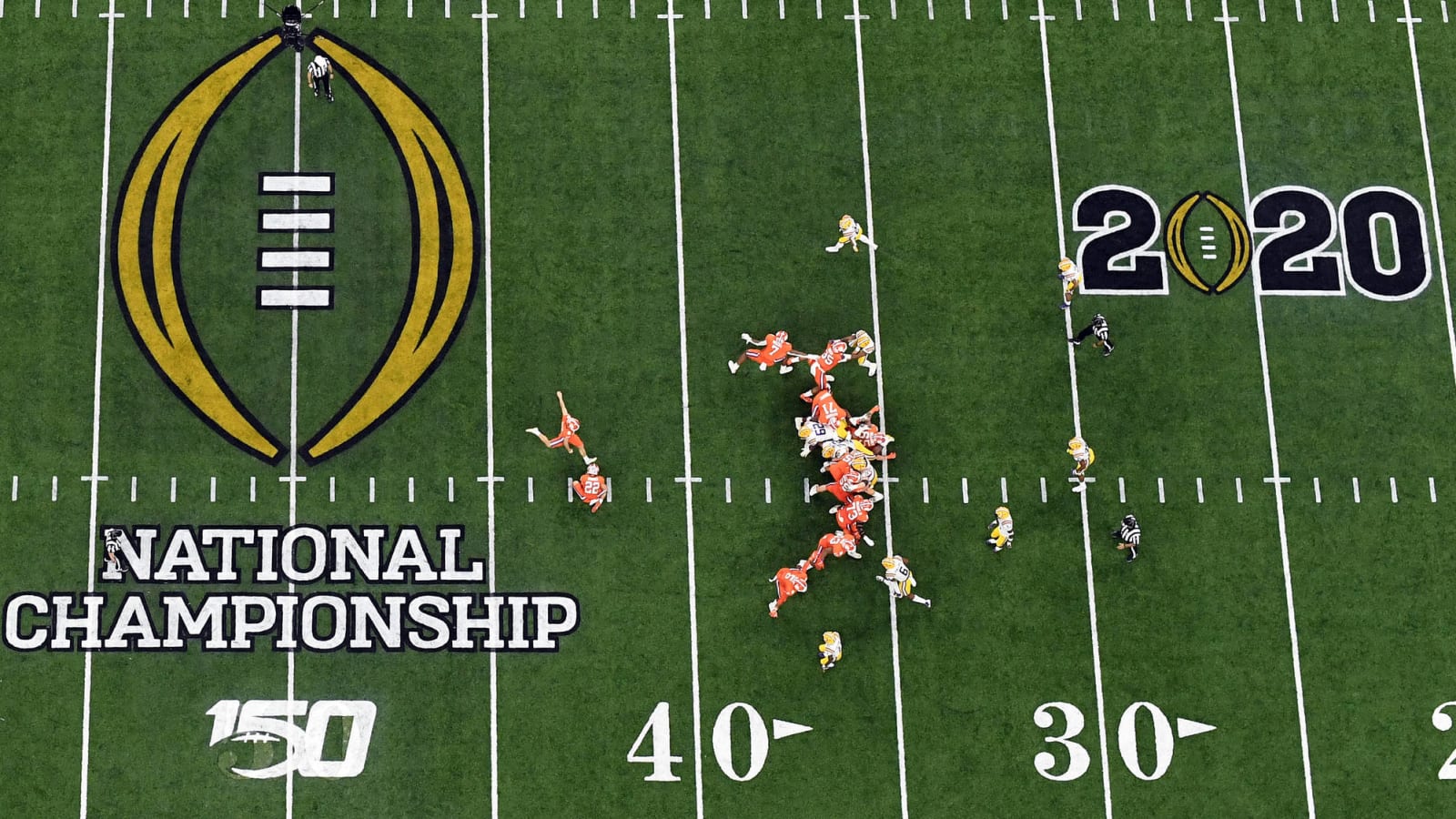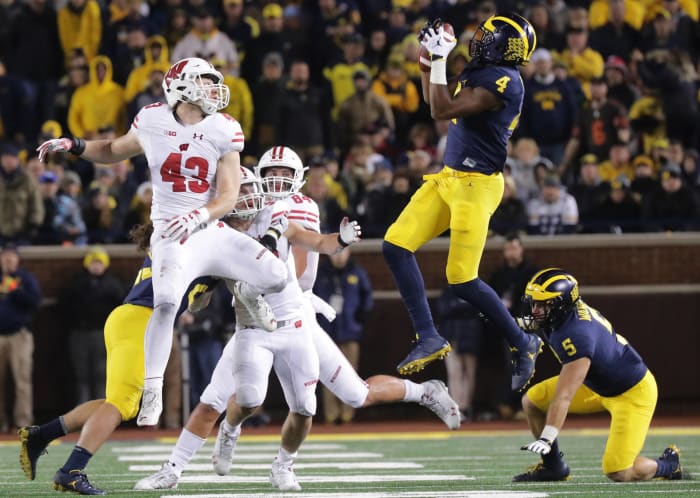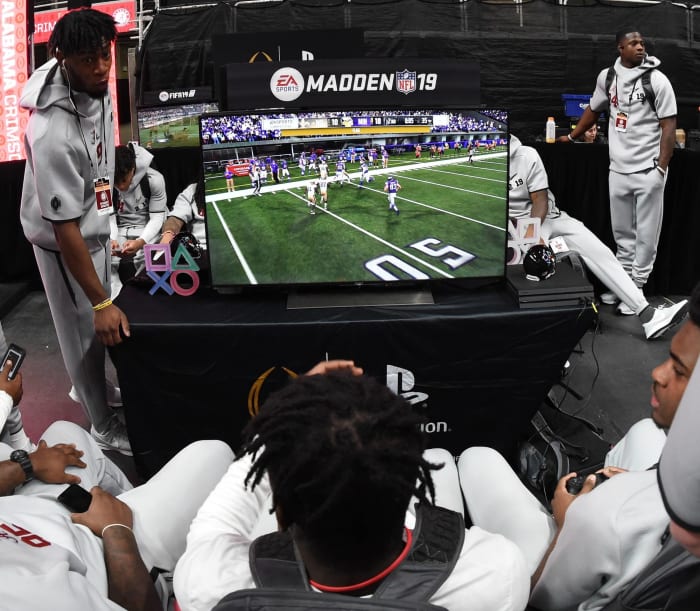
Master scheduler and four-point FG? Re-inventing college football for 2020s
College football is a fantastic, and uniquely American, sport, but it has long been resistant to progress. Heck, it took it nearly 150 years to institute a true playoff system at the top level.
But now it feels like we’re at a watershed moment. College football's future could include an expanded Playoff, athletes profiting off their names and likenesses, and new rules designed to make the game safer.
So how can we improve major college football without ruining the central appeal of the game heading in the 2020s? Here are 20 ways to amp up or tweak the game:
Hire a master scheduler ...
This was an idea floated to me by a college athletic department executive a couple of years ago, and I haven’t stopped thinking about it since. I have no idea if it’ll ever happen given the politics at play — there probably aren’t many coaches, athletic directors or conference wonks who are willing to relinquish control of their scheduling — but think about the possibilities. We already have a sense from all those way-too-early Top 25s about which teams will be in the mix for the Playoff next fall, so why not match up as many of them as possible in Weeks 1, 2, and 3?
... and let him/her create a few 'masterpieces'
Not every non-conference game needs to be a barn burner. But if each major conference team is forced to set up at least one “potentially good” game in those first three weeks, the scheduler should have the power to work with the television networks to ensure that those games are evenly spaced out through the day. That way, we won’t be forced to wear out our remotes just to keep up.
Time for you-know-who to finally cash in
Let's allow athletes to profit off their names and likenesses ... and see what happens. Every time such a major reform is proposed, the reaction from the establishment has been to assure us that the sky will fall and that college sports will be forever tainted. It hasn’t happened yet, and it’s not going to happen with this — and if it does, the NCAA and its partner schools should be smart enough to figure how to reform things so it doesn’t get out of control. Public opinion has changed. It’s time to do something, and this is a good first step. Let’s see how it works, and then we can debate the next steps.
Add 10 yards of creativity
Move the overtime yard lines from the 25 to the 35. College football overtime is far superior to the NFL’s nonsensical counterpart because it operates on a principle of fairness: Both teams are guaranteed to get the ball on offense at least once. The only issue is that it’s a little too easy to score from the opponent's 25, whether it’s a field goal or a touchdown. By moving back 10 yards, you take away the near-guarantee of points and force teams to think creatively.

Seriously, let 'em have their fun
Normally, college football tends to be more progressive with its rule book experiments than the NFL, but not when it comes to the notion of, you know, enjoying things. Apparently college students aren’t mature enough to celebrate properly after a touchdown or a great play, which only makes the sport seem even more hypocritical than it already is. Loosen the rules, NCAA.
Move along, nothing to see here
Restrict those damn replay review challenges to scoring plays and crucial calls in the final two minutes of a game. As the length of college games creeps toward four hours, this is an easy way to maintain the action that doesn’t really corrupt the proceedings at all. Does anyone really care that much about reviewing a 3-yard catch on the sideline on second-and-7 in the first quarter? Let’s save the reviews for the crucial moments (or a challenge), and keep it moving otherwise.
Learn from the Canadians, eh?
We saw what happened in that Ohio State-Clemson semifinal in this year's playoffs, when a catch that seemed like a catch was ruled to be ... not a catch. This tainted the perception of the entire game, and the Playoff itself, without any good reason. Every so often, Canadians come up with a good thing, like Neil Young and poutine. We ought to adopt the Canadian Football League standard of only overturning a call when a "clear and obvious" mistake has been made.
Emulate soccer?
Here’s another easy way to shorten a game: Rather than show me nine insurance commercials in a row, show me, like, four of them and then splay a duck across the bottom of my screen for five or 10 minutes. It works for soccer, and it seems just as likely to seep into my cerebellum than an ad I’m going to skip to flip over to one of the 19 other games on my television.

Kick this play the curb
Eliminate onside kicks and allow teams to "go for it" by converting a fourth-and-20 from their own 35. As football embraces more restrictive safety measures in an attempt to save itself, the onside kick feels like it will soon go the way of the flying wedge — it’s a kamikaze play that’s both thrilling and cartoonishly dangerous. So it feels like it’s time to embrace another option that’s been floated by some experts: If teams can find a way to convert a fourth-and-long — some have said fourth-and-15, but I think that’s a bit too short — give them a chance to prolong the game.
Enough with the chain gang!
Let's experiment with laser technology to determine spots and first downs. This has been discussed for years, and it’s time to give it (or something like it) a shot. Sure, laser technology would not solve all of the problems with spotting a football — you’d still have to determine when a player's knee landed — but it does seem like technology has advanced enough that we shouldn’t have to base these things entirely on guesswork. Let the MAC or some other small conference experiment with it, and it might even help the TV ratings based on the curiosity factor.
Stop this insanity
Yes, LSU's Joe Burrow had one of the great seasons in college football history, and yes, throwing 60 touchdown passes in a season is incredible. But with the SEC championship game and two playoff games factored in, Burrow set the season touchdown-pass record over 15 games, one more than Colt Brennan played in when he threw 58 for Hawaii in 2006 and four more than David Klinger played in when he threw 54 for Houston in 1990. Eventually, every record is going to be skewed toward the modern, which is why we should only count each teams' 12 regular-season games in the record books.
Talk up the 'Tracy Rule'
As inspired by pioneering advocate Brenda Tracy, the rule — instituted at the University of Texas at San Antonio — decrees that “no current or prospective player with a history of serious misconduct — whether it be pleading guilty or no contest to a violent felony or misdemeanor, or having been found delinquent in juvenile court or having been disciplined by another school for such offenses — will be eligible to practice, compete or receive athletic financial aid.” There’s room to apply for an exemption for special circumstances, but this is something we should all be able to agree on.

'Flex' some muscle for Playoff
Implement a "flex" playoff system that would allow the committee to choose four, six or eight teams, depending on the quality of teams. We know now, several years into the Playoff era, that a four-team field sometimes works and sometimes doesn’t. The common refrain is to expand the field to six teams, or eight teams, but why not give the committee flexibility? Not only will it facilitate the best possible postseason, but it’ll also add a new layer of suspense to the regular season — and make every game count.
Simply fan-tastic idea for title games
Allow the team with the higher average home attendance (by percentage of capacity) host the conference championship games. As college football confronts its issues with dwindling attendance, why not make it matter? Imagine if a few hundred fans made the difference between, say, Wisconsin or Ohio State hosting the Big Ten title game. Maybe it won’t make a huge dent, but it could push a handful of people to drag themselves away from their 4K TVs by offering a quantifiable amount of support for their alma maters.
National title game on Monday night? Bleh. Move it to ...
... Saturday, where it belongs.
I know. Monday night draws better ratings for the title game, but nobody actually wants it. We’re tired, it comes on late and it doesn’t exactly help pull in a young audience. College football’s championship game belongs on a Saturday — and if that means the NFL must juggle its schedule a bit to make it work, so be it. We’ll still deliver big ratings numbers.
... and while we're tweaking the Playoff
... there’s no reason why the Playoff games should ever be on anything other than New Year’s Day, unless it’s an NFL Sunday. And in that case, play them on New Year’s Eve. Playing them on a random Saturday in late December feels about as random as having the championship game on a Monday.

Four more points! Four more points!
College kicking is hard for several reasons (we’ll get to another of those in a second), so why not reward a team for trying? Award kickers four points for fields goals 55 yards and longer. A team down 21-17 in the final minute could get a shot at overtime with a big-legged kicker, and it would only make the dilemma of what to do that much more interesting.
Free kickers from hell
The fact that college football’s hash marks are far wider than the NFL’s makes for a different — and often more creative — game. But it’s also hell on the field-goal kickers, which is why the #collegekickers hashtag has become a running joke on Twitter. So why not let them place the ball anywhere they want between those hash marks? It’ll make the games more interesting, particularly if the four-point field goal rule is instituted.
And speaking of hellish punishment
Stop it with vacating wins. We’ve reached the point now where the NCAA’s notion of somehow bowdlerizing history seems perverse and unnecessary. Yes, if a program is involved in something truly terrible, it should face some sort of punishment — ideally, one that hits at the coaches and administrators involved rather than the athletes who had nothing to do with it. And while we’re at it, give Reggie Bush his Heisman back.
A video (game) we all want to see
This one’s obvious. The only thing holding back the return of EA Sports’ NCAA Football video game are the NCAA and its member schools, mostly because they’re afraid of what the repercussions might be. But the future is here. Athletes are going to get paid, one way or the other, so why not open up a new revenue stream that makes us all happy — and could help create a new generation of fans?
More must-reads:
- Super Fan sections and King of the Hill? Bold ideas to re-invent NBA for 2020s
- One 30-team league, robot umps and 'mercy': 20 bold ideas to save MLB
- The 'AP First-Team All-Pro tight ends' quiz
Breaking News
Customize Your Newsletter
 +
+
Get the latest news and rumors, customized to your favorite sports and teams. Emailed daily. Always free!

